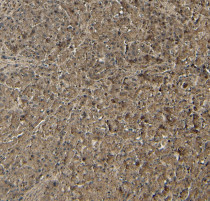ARG63721
anti-PCSK9 antibody
anti-PCSK9 antibody for IHC-Formalin-fixed paraffin-embedded sections,Western blot and Human
Cell Biology and Cellular Response antibody; Developmental Biology antibody; Metabolism antibody; Signaling Transduction antibody
Overview
| Product Description | Goat Polyclonal antibody recognizes PCSK9 |
|---|---|
| Tested Reactivity | Hu |
| Tested Application | IHC-P, WB |
| Host | Goat |
| Clonality | Polyclonal |
| Isotype | IgG |
| Target Name | PCSK9 |
| Antigen Species | Human |
| Immunogen | CRSRHLAQASQELQ |
| Conjugation | Un-conjugated |
| Alternate Names | PC9; Subtilisin/kexin-like protease PC9; Proprotein convertase 9; Proprotein convertase subtilisin/kexin type 9; Neural apoptosis-regulated convertase 1; FH3; EC 3.4.21.-; HCHOLA3; NARC1; LDLCQ1; NARC-1 |
Application Instructions
| Application Suggestion |
|
||||||
|---|---|---|---|---|---|---|---|
| Application Note | WB: Recommend incubate at RT for 1h. * The dilutions indicate recommended starting dilutions and the optimal dilutions or concentrations should be determined by the scientist. |
Properties
| Form | Liquid |
|---|---|
| Purification | Purified from goat serum by antigen affinity chromatography. |
| Buffer | Tris saline (pH 7.3), 0.02% Sodium azide and 0.5% BSA. |
| Preservative | 0.02% Sodium azide |
| Stabilizer | 0.5% BSA |
| Concentration | 0.5 mg/ml |
| Storage Instruction | For continuous use, store undiluted antibody at 2-8°C for up to a week. For long-term storage, aliquot and store at -20°C or below. Storage in frost free freezers is not recommended. Avoid repeated freeze/thaw cycles. Suggest spin the vial prior to opening. The antibody solution should be gently mixed before use. |
| Note | For laboratory research only, not for drug, diagnostic or other use. |
Bioinformation
| Database Links |
Swiss-port # Q8NBP7 Human Proprotein convertase subtilisin/kexin type 9 |
|---|---|
| Background | This gene encodes a proprotein convertase belonging to the proteinase K subfamily of the secretory subtilase family. The encoded protein is synthesized as a soluble zymogen that undergoes autocatalytic intramolecular processing in the endoplasmic reticulum. The protein may function as a proprotein convertase. This protein plays a role in cholesterol homeostasis and may have a role in the differentiation of cortical neurons. Mutations in this gene have been associated with a third form of autosomal dominant familial hypercholesterolemia (HCHOLA3). [provided by RefSeq, Jul 2008] |
| Research Area | Cell Biology and Cellular Response antibody; Developmental Biology antibody; Metabolism antibody; Signaling Transduction antibody |
| Calculated MW | 74 kDa |
| PTM | Cleavage by furin and PCSK5 generates a truncated inactive protein that is unable to induce LDLR degradation. Undergoes autocatalytic cleavage in the endoplasmic reticulum to release the propeptide from the N-terminus and the cleavage of the propeptide is strictly required for its maturation and activation. The cleaved propeptide however remains associated with the catalytic domain through non-covalent interactions, preventing potential substrates from accessing its active site. As a result, it is secreted from cells as a propeptide-containing, enzymatically inactive protein. Phosphorylation protects the propeptide against proteolysis. |
Images (2) Click the Picture to Zoom In
-
ARG63721 anti-PCSK9 antibody WB image
Western Blot: Human Adipose lysate (35 µg protein in RIPA buffer) stained with ARG63721 anti-PCSK9 antibody at 0.3 µg/ml dilution.
-
ARG63721 anti-PCSK9 antibody IHC-P image
Immunohistochemistry: Human Liver stained with ARG63721 anti-PCSK9 antibody at 4 µg/ml dilution.







